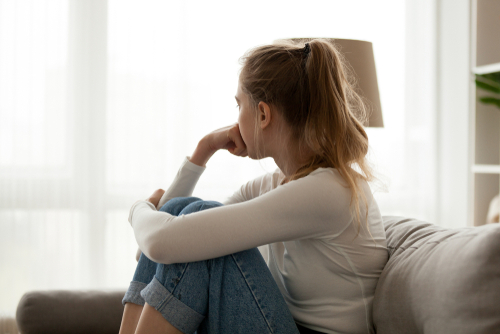Even if a picture of a crying child as parents leave for work is the first thing that pops into your mind when you hear the words separation anxiety, the feeling behind it might not seem so distant and childish to many people. The overwhelming fear of being away from people you love, particularly your partner, can be quite familiar to many adults and their relationship. People tend to hide these feelings as they are often viewed as immature, insecure, or even selfish.
Nevertheless, they do exist even in adulthood, and most of us can think of at least a few examples of having felt this way. While it’s perfectly normal to occasionally feel lonely when you’re away from your partner, in some cases these feelings get out of control and cause severe distress and pain to some people. This is a clear sign you need to address them.
What Is Separation Anxiety in Adults?
To get a better understanding of separation anxiety in relationships, let’s go through the most common manifestation of this issue. Like the name says, this is an intense fear of being separated from the people you love and them living their life without you in it. These are the people that make you feel safe and cared for, so this feeling can be perfectly reasonable, as nobody likes to be away from the people they love. However, there are cases when people feel irrational fear, panic, anxiety, and overall distress at the very thought of not being around their loved ones.
These are the situations that need to be recognized and addressed because they can cause severe stress in your everyday life and prevent you from making rational decisions. Separation anxiety is not equally serious in all cases. It can be mild for some, while others may experience overwhelming levels of stress and anxiety preventing them from the most basic functioning in their everyday lives.
People suffering from separation anxiety usually feel a strong and irrational fear they might lose a loved one, most frequently a romantic partner, in various ways. Those can include injury, accidents, illness, and death, or they may fear being abandoned by the person they love.

How Do I Know If I Have Separation Anxiety In My Relationship?
As opposed to small children, whose separation anxiety is common and presents a normal stage in their development, adults who experience these unsettling feelings and fears generally have unhealthy attachment styles.
Adults who suffer from separation anxiety experience both emotional and physical symptoms that include negative thoughts and obsessive worrying. When it comes to physical signs they present as typical anxiety symptoms like having trouble sleeping, headaches, nausea, or feeling unwell without a clear cause.
If you’ve been living with these feelings, you might not even be able to tell that something might be wrong and that you don’t have to feel that way. To get a better understanding of what separation anxiety in a relationship is, consider the following behavior patterns and how much they apply to you:
- You feel unfounded worry and fear that people you love might disappear from your life or be fatally injured.
- You refuse to be away from your loved ones and experience severe distress if you do.
- You have difficulty sleeping when you’re away from your partner and feel extreme fear that something bad might happen to them.
- You experience frequent depression or anxiety episodes or have panic attacks if separated from your loved one for a period of time, or even just thinking about being away from them.
What Can Cause Separation Anxiety In A Relationship?
The causes of separation anxiety can be divided into several categories. Since this is a type of anxiety disorder, hereditary factors may play a significant role in its development. Children of parents suffering from anxiety are more likely to experience it both as children and grownups. Adults who are already diagnosed with generalized anxiety disorder can often experience separation anxiety too as one of the many manifestations of this type of disorder.
However, genetic predisposition is not a guarantee that someone will suffer from these issues. Environmental factors play a significant role as well. Just like someone with a genetic predisposition can maintain happy and healthy relationships, the opposite can happen too. People without a family history of anxiety disorders can develop separation anxiety caused by environmental factors and various stressors experienced later in life.
The most common environmental causes of separation anxiety in adults are:
- Childhood neglect, abandonment, or other attachment issues.
- Adverse environmental conditions or stressful changes.
- Codependency in a romantic relationship and putting your partner’s needs above yours.
- A history of rejection or abandonment in previous relationships.

What Are The Negative Effects Of Separation Anxiety On Your Relationship?
Separation anxiety is most obvious in romantic relationships because they make people particularly vulnerable and exposed. Being intimate with someone and opening up to them may also mean opening a lot of suppressed emotions, including those from early childhood. People can be unaware of the underlying causes of their separation anxiety issues and this can cause a wide range of problems in romantic relationships as reasons that drive their behavior patterns or negative feelings, and fears are often not obvious.
Those feelings can manifest as:
- Extreme possessiveness that can overwhelm the partner.
- Emotional distress that affects everyday life.
- Trouble sleeping.
- Mood changes, anxiety, and depression.
- Avoiding leaving the house or other irrational fears.
- Risky behavior, substance use, or bad decision-making, all driven by fear.
There are, of course, cases when separation anxiety isn’t completely unfounded. People who enter romantic relationships with partners with avoidant attachment styles may be particularly susceptible to these issues.
Traits of love-avoidant people can make things worse, as they crave independence and self-reliance. They don’t feel comfortable relying on others or having others depend on them, this is why they tend to push their romantic partners away which can easily trigger separation anxiety in their partner.
Learn How To Cope With Relationship Separation Anxiety In PIVOT’s Individual Sessions Or Small Group Settings
If this made you reconsider or recognize some of your behaviors and feelings, you might benefit from learning how to cope with separation anxiety in your relationship. You’re certainly not the only person to feel this way and, while learning how to deal with such feelings requires some effort on your part, professional guidance is available to lead you toward your goal.
You can make the first step through PIVOT coaching sessions. Our experienced and caring advocates can help you recognize and change unhealthy thoughts and behavior patterns, which can, in turn, make you better equipped to deal with your romantic relationship issues. You can learn more about love-avoidant traits, separation anxiety, and how they interact.
You can also work through the unhealthy patterns and learn to deal with these issues in a comfortable group setting of retreats for individuals. Start building trust and love in your relationship and avoid the traps of separation anxiety.